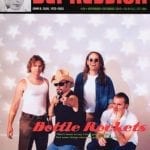Two Time Polka – Dance this mess around
Saturday night is a universal thing. So notes Ray Barron, the mandolinist and visionary creator of the Irish band Two Time Polka. He’s an expert on the subject: Two Time Polka is an Irish Cajun band.
In fact, it’s Irish Cajun bluegrass rockabilly neo-folk, playing music ranging from Bill Monroe’s to Chuck Berry’s to Bob Dylan’s to, uh, I. LeJeune’s. It does so employing Cajunesque instruments — accordion, concertina, washboard — and singing some of the songs in (almost) Gallic-sounding Louisiana-ese with requisite swamp sizzle.
Barron has plied his musical trade from Cork to Australia but has yet to visit Louisiana. Except for one quick New York vacation, he hasn’t even been to North America. Yet, despite its availability in the U.S. only online, Two Time Polka’s recently released second CD, About Time Two, has been getting a few plays on NPR-ish radio in Los Angeles, Chicago, and even Baton Rouge.
Titles include Monroe’s hot “Roanoke” and “Jerusalem Ridge” as well as his plaintive “Roxanna Waltz”. There are also Dylan’s “Blind Willie McTell” and Berry’s “The Promised Land” (and an aberrational “Hound Dog”, but skip that) alongside lesser-known Kathy Chiavola’s beautifully churchy “Azalea Waltz” and a chilling paean by J. Dolan called “Tokyo Rose” about the World War II Japanese radio vixen. Especially effective are “Bayou Pampon”, “Lacassine Special”, “Eunice Two-Step” and “Another Lonely Night”, Cajun songs that moan and writhe with the sweat of Spanish moss midnights.
But…how?
“We really didn’t know what people would think at first,” Barron confides digressively. “But once you start up with the Cajun music, three notes in, it’s happy.”
Truly. Possibly nobody knows more about making a Saturday night worth a Sunday morning than Cajuns and Irishmen. Theirs, though, was a twain unmet until now. How did Barron ever hook up with French-singing Tomas Dunne?
“The whole thing started quite casually,” Barron answers. “We had a friend who ran a pub on an island off the south coast, and he phoned up and said, ‘Look, we need some music for the weekend.’ The singer I’d been working with was playing with another band at the time, so I phoned Tomas and said, ‘Hey, do you fancy going down there for a small kind of get-together, playing for people on the island Saturday and Sunday night?’
“I had known Tomas on and off from playing in Irish sessions. I’d always wanted to work with him, because whenever I found him a gig he had a great stage presence.”
That was ten years ago. Dunne said yes to the island hop, and bad weather then stranded them there together for an extra three days. They came home friends and for the next couple of summers teamed in a four-piece group to do small-time shows around Cork and Kerry.
“Then,” Barron says, “it started to get popular.” They got asked to play bigger venues, then festivals. After they recruited a drummer to help with the larger shows, they found themselves playing not just “semi-acoustic traditional Irish music” anymore. Their sound had taken on a “dancehall” feel, Barron recalls, and they found a distinctive place within a Cork music scene that Barron describes as uniquely influenced by American as well as Irish traditional sounds.
It must be. He says he already was well into bluegrass and Monroe by the time he got introduced to Cajun sounds through such movies as Southern Comfort and Heaven’s Gate. His initial reaction the Louisiana sound was curiosity: “What is that stuff?”
The more he heard, the more curious he became. After the band learned to play the Cajun instrumental “Cherokee Waltz”, he remembers, he realized vocals were also important in Cajun music, but he had no idea how Two Time could pull that off. At first he had no clue what the words even meant. Then, he recalls with a brief laugh, he “realized that Tomas could have another use for his school French.
“We kind of gradually got into it, little bit by little bit,” he goes on, then succinctly explains why they went so far: “It’s very infectious.”
A friend helped by giving them a book of Cajun lyrics — Raymond E. Francois’s Ye Yaille, Chere. So after that, they understood what the songs were saying, right?
“Weeeeellllllll, yes, sometimes,” he says, with another small laugh. “The singing is so strange, you know. Even French friends had kind of…difficulty with it.”
Which, on reflection, may help explain the appeal of Cajun music, and of Two Time Polka. Listening to the band’s brand of Cajun-ness, the singing is very important, but the words aren’t. Dunne’s sweaty voice, Geraldine Barron’s emotional accordion, her husband’s lightning mandolin, and the rest of Two Time’s six excellent pieces are what add up to this unlikely equation’s fiery sum.
You feel all you need to know.




